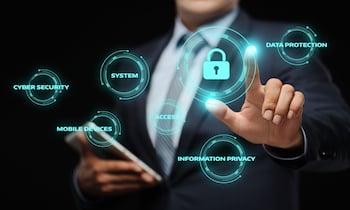
1. Update Your Passwords
If you remember your passwords, they’re probably too weak. And if you’re using the same password for multiple applications, you’re especially vulnerable to identity theft. Each password should be unique, at least eight characters long, and combine letters, numbers and symbols. To take the guesswork out of generating and remembering complex passwords, use a password manager application.
2. Use Two-Factor Authentication
Most websites, email providers, and online banking applications now offer two-factor authentication. It works by sending a text message code to your phone when you log into an application. This added step prevents cyber thieves from stealing your passwords and logging into your accounts. Make two-factor authentication part of your data security practice.
3. Browse with a VPN
Public WiFi hotspots may be convenient, but they’re inherently risky; a hacker can potentially access all your personal data, including your emails, credit card numbers, and online banking information while you’re connected to public WiFi. If you must use public Wi-Fi, use a virtual private network (VPN). A VPN uses a proxy server to protect your personal identity and location while you browse the web and send and receive data.
4. Avoid Posting Too Much on Social Media
Facebook, Twitter, and Instagram have made it easy to post every detail of your life. As a result, cyber criminals scour social media sites looking for carelessly-posted personal information. Update your security settings so your social media profile is only shared with friends and family. And think twice before posting financial, medical, and personal information.
5. Don’t Fall for Phishing Scams
Phishing is a scam that targets individuals by sending them a seemingly-legitimate email which requests personal and financial information. Cyber criminals often “spoof” email addresses so it appears that you’re receiving a request from a friend or family member. To avoid phishing scams, only communicate with people you know or trust, never click on suspicious links, and when in doubt, separately verify with the sender that the email is really from them before taking any action.
6. Share Your Knowledge
Preventing cybercrime takes a collected effort. Whether you’re concerned about your personal or business information, be sure to share these data security tips with your friends, family and co-workers. Together, we can make a difference!
For more data security tips, please contact us by phone or complete the form on this page. Here’s to a safe and secure National Cybersecurity Awareness Month!



